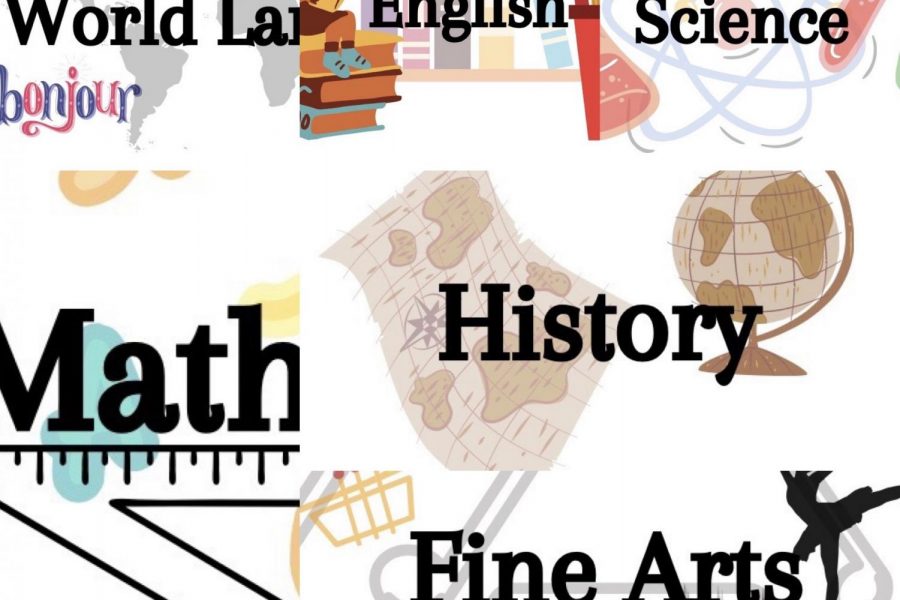Credit: Taylor McGuire
WHS department heads share the ways their department has been affected
Nicole Haghdoust (World Language) 
How has the department as a whole adapted to COVID-19?
We have adapted to COVID-19 by making our curriculum accessible digitally. Each of us has made slideshows, so students who are remote can access the same tasks.
What are some of the biggest changes to class curricula?
I would say that the biggest change to curricula is the difference in speaking activities. We tend to do many group and paired speaking activities, and working in a hybrid scenario has changed the way we do these tasks.
How have the Advanced Placement classes adapted?
AP classes have adapted by sticking to their strict schedule to get through the units. Some of the additional content [has] been adjusted to make sure they get through their units.
What has been the biggest setback and concern?
I think what has been difficult is only seeing our students once per week in person.
Is there anything you’re hopeful about or looking forward to this year?
I am hopeful that the worst of the virus has passed. It seemed like in the late fall/early winter that many students were out [out of school quarantining or had COVID-19], and now less of that is happening.
Brian Keaney (English)
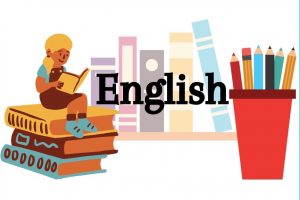 How did the English department first pivot to online learning last spring?
How did the English department first pivot to online learning last spring?
One of the first things we realized is that some of the assignments that we would usually do required a lot more in-person support and meeting with students quite frequently, which we couldn’t do. [We] also felt that because [the] events [going on] were so big, and there was so much in the news about it, that we really wanted students to write about what was going on. We switched from more academic/analytical writing to more expressive, reflective pieces, which actually was pretty revelatory for us. I think it was a combination of the times–there was so much going on–and also students had a lot more time to actually sit and think and write because there wasn’t much else they could do.
What happened was a number of us were just amazed at what students were producing, even students that hadn’t been doing so well beforehand, suddenly got really engaged in their writing. I think that’s something going forward that we want to keep incorporating more of into the curriculum as we go along.
The reading was kind of tougher because some people had books in hand from when school shut down, but some didn’t, and we went through that period where we weren’t really doing any grades or anything, and then we were, so people kept modifying what we were doing in different ways. One of the other things we did was, for each grade level, we created these shared folders where people were finding articles and videos that we thought we might be able to use that were related to the events going on.
There was one phase where we pretty much created curriculum from the ground up. Especially for the 9th and 10th graders, we were picking these themes around, say, the theme of courage or something like that. What we did collaboratively was come up with materials and ideas of things and assignments people could use and pick from, so it was a lot more collaboration.
How did you plan the curriculum for this year?
The biggest thing that we decided was that we would start the year with having students do a lot of personal writing, especially in the first month, so that we could try to get to know who [they] were. [We made] students the subject, sort of the content themselves, for the first four to six weeks, and then transitioned to other units. We made modifications to assignments. We also knew we weren’t going to be able to assign as many books as we might in a regular year, so [we decided] which ones would be the most beneficial to students, which ones will keep students engaged the most, given that some days we’ll be here, some days not. That’s how we went through it, [and] it’s still an ongoing process. It’s not like we planned everything over the summer, and it just went like clockwork. There was no way that was going to happen.
How does this year’s English curriculum compare to a regular year?
I think it’s not a matter of quantity but quality. What we really tried to do was, at each grade level, identify the key skills we really want to highlight knowing that we can’t do as much as we usually do. We focussed on what’s most important developmentally. That’s how we went about it, and then people chose what to do from there. For us, especially in English, it’s not a matter of “Oh, there was this lack of curriculum coverage” at all. I think we just kept trying to pare things down to what is the most important stuff we could do, and [figure out] which items would most engage students to achieve those ends.
Are teachers concerned about students’ progress at all?
It’s a mixed bag. I think for the most part, no. In Wayland, [students] already have pretty high literacy rates, so that’s already an important part of our job. I think there are places where people are feeling “eh,” and [that] there are students going forward over the next couple years who are going to need some extra attention in areas x, y, z or whatever. In terms of who I think has been the most impacted by this, I think seniors have been affected the least. So in that sense, that’s good, because we had just this one year to deal with them. Almost all the seniors are in a good spot in terms of literacy skills, so that’s okay. I’m most concerned with 9th graders, they’ve had the toughest time. They had no knowledge of the school pre-COVID-19 and no connection to the school other than what they’ve experienced this year, which certainly is lacking compared to the experience they would have had, had they been able to do different activities and things like that. [However], we’ve also got three more years with them, so I think we’ll be okay.
How have teachers adapted to offer extra help and support?
The old way of students scheduling conferences, when we could just meet with [them] in the office, wasn’t possible this year, so we’ve been doing a lot of Zoom conferences, and some Wednesdays are pretty packed. Because students didn’t have as many frees periods that much up with teachers, the Wednesdays have been really helpful in terms of scheduling conferences. In terms of where it’s been tough is, because of the schedule, we couldn’t put in the extra lab sections we usually have for College English One and College English Two, and those are sort of built-in conference times for students. That’s something that we’ve missed this year, because that generally targets students who are less likely to schedule a time on their own. For students who’ve wanted to seek help, we’ve been able to make time, and I think everyone has made time in classes to be able to work with students on assignments as much as possible.
How has your personal experience with the year been?
I think as with many other people, both the pandemic and the social justice movements around the George Floyd murder and the state of American politics has really given me [time to pause and think] about a bunch of things. I guess i’ll put it this way: my biggest fear is that we’re going to get through this year and then everybody is going to want everything back to the way it was before, whether it be the old schedule or just the meat grinder that is Wayland High School. I think if we’re just going to do that, we’re going to miss a big opportunity, and I hope out of this we can take something from what we’ve learned.
Have there been any silver linings to the year?
Absolutely. We’ve talked to many students, and one thing they miss is seeing their classmates and being all-in, but I think they’ve liked this schedule a lot more. I think the Wednesdays have been a real blessing. The other big fear I have is that we’ll go back to what we had before, and I think we’ll see an even greater increase in students struggling socially, emotionally and with mental health issues. I think the other thing is to try to make, as far as English goes, curricula engaging for as broad a range of students as possible and really busting open the curriculum in terms of book selection and really kicking that door down. But that’s going to be a multi-year process.
Kevin Delaney (History)
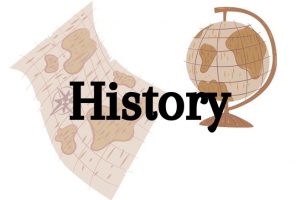
How did the history department initially pivot to online learning last spring?
The history stuff sort of took a very quick–it wasn’t an exit–but went down the ladder rungs quickly, and it was a lot more about making sure our contacts were there and continuing the relationships that we had, which we were lucky [to have]. At that time We had almost three quarters of the year under our belts so we knew each other well enough where we could continue doing things virtually–imperfectly–but nevertheless in a kind of authentic and sincere way that, starting this year, just wasn’t the case.
So there was a lot of winging it, like how much history can we do, how much history we should do, kind of making it up as we were going along. Eventually, maybe three or four weeks [in], [administration] decided we could do more than enrichment learning. A hobby I like to do is woodworking and making furniture, it’s a thing I like to do and have done for many decades. I thought “hey, wouldn’t it be fun to have students do a building project that has a history connection to it?” We have these old books available in the archive that are designed for boys and girls about 12 to 15 years old in the 1890s, and they basically have all these cool project kids could make in those days. Wouldn’t it be fun to have kids do something history-ish in the era we were already studying? One thing to help get kids out of the house and into the garage or wherever they might go–into the woods even–to make a terrarium or animal traps or crazy things that kids would do in the 1890s, back when there wasn’t a lot of consciousness about safety. A lot of them were weapons, so 16 year old boys who had been housebound for a month were very excited about some of those things.
Because of COVID-19 we thought that unlike these other projects which are regional or a lot of local history and seeing big picture themes in our local history here, we thought it would be fun to think about future historians and leave them with a time capsule of sorts that they can then use in the future to determine what was it like for 16 and 17 years old during the lockdown. All of this is student work, the photographs, projects and wrings students did.
Check out “Locked In: The Sick Spring” on the Wayland History Project website or at this link.
How did the history department prepare for this year?
We had a couple of weeks in addition to a lot of time over the summer to figure all this out. All the teachers were here working to get ready. That’s when we really started to dig into other sorts of technologies that we didn’t get a chance to really learn last year. We wanted to expand our repertoire, knowing we could be in “Zoom land” for a long time. We knew that we had to pare down especially just given the schedule. The number of minutes we meet is diminished pretty markedly from the regular schedule, and on top of that, there are other impediments.
We tend to take a less is more philosophy in a lot of our classes–unless you take APUSH, because then you have to do it all. We’ve never felt like you should just cram as much history as possible, but rather let’s do more in-depth case studies. It was sort of a natural evolution for us, because that’s sort of our overriding philosophy, that less is more. You can learn more by teaching fewer subjects because a it’s easier to teach skills, and you can take a deeper dive into the diversity of experiences and stories, so you walk away with a greater understanding, rather than a mile wide and an inch deep, where you get a huge amount of volume but not a lot of depth.
Are you concerned at all about students’ progression?
We all needed to pare back on our units and try to make decisions about what’s most important for students to learn right now, and what’s not as imperative, and we had to whittle away things to maintain a really high quality history experience but also cater it to the exigencies of the COVID-19 reality. A lot has been pared back, and at least in my case, that’s resulted in one less big paper than I would normally do. Im sure it’s fine; kids are like, “One less paper, great!” but as we’re prepping you for the next phase in your academic careers, it just worried me a little bit that what I think one of the greatest strengths of the Wayland college prep was maybe diminishing a little bit.
Overwhelmingly, when we hear back from kids in college they can’t believe how well prepared they are to write. They get these challenges to write, whether they’re more literature type essays or history type essays, and they feel like they can pull it off. It’s both fulfilling and distressing to hear “a lot of my peers just don’t know how to do that stuff.” [Alumni] kind of gain appreciation for the preparation that may feel like a grind when you’re here. So anyway, that kind of worried me a little bit. I’m still worried about that. The first paper I had my students write this year was a paper about Abraham Lincoln. It’s kind of a complicated paper, and I could tell, and they are a lot of really smart, hard working kids, but I could tell–I’ve been teaching for 32 years–I could tell that they’d missed something as a general rule last spring because they didn’t actually write a paper that is part of process that we do… it brought home to me–and not all teachers have had this experience–that there was a loss. There was a learning loss in development.
What has been the biggest challenge for you this year as a teacher?
Relationship building with a whole new set of kids. It’s been great, it’s just been different especially earlier in the year. It’s a very different kind of thing when you’ve got 25 new faces on Zoom, and when you don’t have the proximity, and there’s something about physical space sharing that generates more authentic human interaction. Even though we’re having a good conversation, especially in a group conversation, it’s just not the same. You lose a lot. The humor, the quick asides, and it’s just harder to pick up on some of the subtleties that happen with presence in a classroom. It hasn’t been a catastrophe, but that’s been hard. This is my last year teaching too, so it’s kind of a bummer it has to end on that, but whatever, you know? Life can be crazy and throw you all sorts of curve balls, and this one isn’t so bad for me, all things considered. But it’s still kind of a drag to have to end the year–and my career–on a note where I feel I haven’t been able to do my best work with students, despite my efforts.
Have there been any silver linings to the year?
I do think so, and I hear a lot of teachers say this in terms of ease of technology use. We’ve probably gained 10 years of teaching and learning technology in one year of time. I don’t mind, and I don’t really do it too often because students aren’t that psyched, but Sunday afternoon we can have a conference at different times that might work for a student athlete. They are good conferences with sharing, and I can see [their] work, so that’s great. We’ve been doing that a lot. I see great new opportunities for professional development that teachers can use. So definity some silver linings stuff there.
Barbara Coughlin (Math)
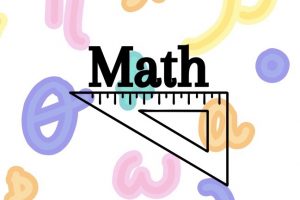
How did the math department prepare?
Teachers are often overwhelmed in the school year, and we were forced to do crazy professional development over this year to learn things that would otherwise take years to incorporate. We have some teachers using Desmos in crazy ways that are totally cool.
What have you done on Desmos, and what other programs did you have to learn?
We have learned so much about Desmos this year in a way I have never known, and the way I’m using it is so not the way it was intended to be used. Also, [we’ve been using] Deltamath. [It’s] a stupid silly website, but it’s awesome because where it’s good it’s good, but where it’s bad it’s bad. It can be really helpful though. For my Algebra 2 kids, they’re learning factoring, so I can just be like hey here’s more practice. For skills stuff it’s really good because you get your answer back instantly. We’ve learned some good things.
What challenges did the math department have?
I hope somewhere in your article you talk about all the resources we have after all the challenges we went through, like how to plant the document camera and running zooms. We really have to appreciate the talent that this school has. I’ll speak for the math department. We have a group of very intelligent, capable teachers, and if you look across this country there are a lot of people teaching math that shouldn’t be teaching math. There’s so much work we had to do last summer, and everyone had to figure it out across the nation.
What do you wish could’ve been noticed more?
Obviously, there are things that are horrendous. This was a super rushed process and every department had to cram, but I do think it went pretty well. People feel pretty safe. I think, at some point, it would be better if the press took notice. I really want people to appreciate the people that tried to make this work, and it’s really working well, and I know kids want to be back in school and you guys want prom, but in the context of COVID-19, I think we’ve done a really good job–[and] not just the math department.
Kenneth Rideout (Science)
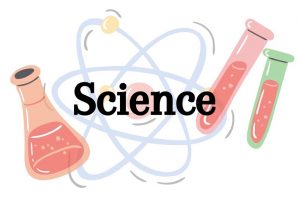
How has the science department been forced to adapt to the new schedule?
It’s been pretty dramatic as it has for all the teachers at WHS. The longer blocks, the less frequent contact, the Zooming–it’s forced a major redesign in all of our courses, both in terms of scope and often in sequence as well. In addition to these common challenges for all departments, the science department has to contend with the loss of ability to do traditional labs: four students working in close proximity with shared equipment, etc.
How has the removal of labs affected the curriculum?
It’s a big deal. The labs are often the anchors of the units. Some labs are used as introductory activities in a unit, sometimes extensions and sometimes used as a review. When we lost the ability to drop these labs where we are used to employing them, we need to substitute some other activity in order to fulfill its role in the curriculum. Some individual lab activities are being implemented, of course, and a lot of us are using online lab activities, but it just isn’t the same.
Did you bounce any ideas off with your coworkers?
Always, although that too has been much harder due to the social distancing restrictions. Sure, we can arrange for a meeting over Zoom or a socially distanced meeting in person, but a lot of collaboration used to happen spontaneously over the copy machine, shooting ideas back and forth in the office, etc.
Which ideas worked and which didn’t?
Like almost everything about teaching, there are so many solutions that can and do work in the right situation. It’s a question of which ideas fit the course, the teacher and the cohort of students they have that year. Usually an experienced teacher has a lot of pedagogical tools in their belt to respond to the ever shifting sea of students they have each year, but with all the changes this year, it’s as if we are all first year teachers and that can make for a very frustrating experience sometimes. Some are flipping the classroom, some are Zooming-to-room, some are doing both. A hybrid of hybrids, if you will.
Is there anything that you regret doing?
We are all lucky to be teaching at Wayland High School where there is a culture of “try it out and see what happens:” keep what worked and discard the rest. I would say that some regret is part of the job in general and we all knew, going into this year, there were going to be a lot of “on the fly” adjustments–and there certainly have been many of those! One thing I’m noticing is that I’ve been doing a lot less traditional assessment this year, and I think it has really hindered my students’ progress in science. The review process for and focused nature of assessments really [are] invaluable in the learning of science. I’m adjusting now, but that is a regret I have from semester one.
Susan Memoli (Fine Arts)
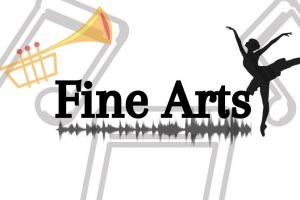
What were some adaptations that the Fine Arts Department had to do with the new schedule?
The new schedule has put all content areas on a level playing field. Where students might be pulled from a Fine Arts class for a lab, this has not been the case in this schedule. It is great to have a rehearsal and be able to rely on all of the students to make collective progress. The unexpected longer blocks have also been beneficial for rehearsals, set-up and clean-up of visual art materials and delving more deeply into content in general.
How did the Fine Arts department tackle these challenges?
As a department, both WHS and K-12, my Fine Arts colleagues have been one of the greatest resources as we have navigated the schedule, the realities of teaching during COVID, technological challenges with Zoom-to-room, personal impacts and balancing the challenges of this time.
Is there anything you feel like you could’ve done better or worse, and what are your biggest conclusions over this past year?
I believe that we did the best we could with the curve balls we were thrown. At each turn, we found a new way, tried things, found things that worked and things that did not [and] tried all over again. Digging deeply and being resilient are critical skills. This has been a time that has demanded more emotionally and psychologically than we can measure. It has also been a time of great creativity and learning. Hopefully, the positive takeaways can be sustained and the pain can be released. Looking forward to getting everyone back together again!
